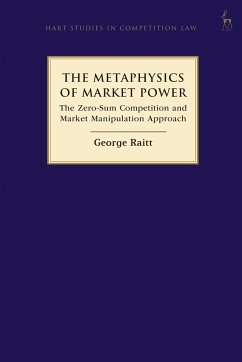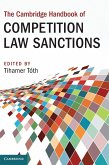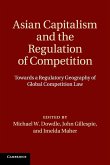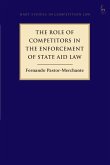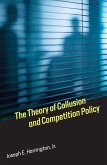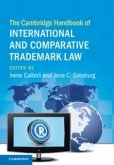George Raitt
The Metaphysics of Market Power
The Zero-sum Competition and Market Manipulation Approach
George Raitt
The Metaphysics of Market Power
The Zero-sum Competition and Market Manipulation Approach
- Gebundenes Buch
- Merkliste
- Auf die Merkliste
- Bewerten Bewerten
- Teilen
- Produkt teilen
- Produkterinnerung
- Produkterinnerung
Australian competition law has just emerged from a significant period of reform which has seen controversial changes to the legal test to distinguish between normal competitive conduct and conduct that should be condemned. The controversy continues, arguably because the traditional legal conception of market power does not provide a useful standard in real world markets. This important new book offers a radical interpretation of market power, based on the power to manipulate. Seeing it in this way allows for positive and normative standards within which to frame a legal theory of liability for…mehr
Andere Kunden interessierten sich auch für
![The New EU Competition Law The New EU Competition Law]() Pablo Ibanez Colomo (London School of Economics and Political ScienThe New EU Competition Law28,99 €
Pablo Ibanez Colomo (London School of Economics and Political ScienThe New EU Competition Law28,99 €![The New EU Competition Law The New EU Competition Law]() Pablo Ibanez Colomo (London School of Economics and Political ScienThe New EU Competition Law119,99 €
Pablo Ibanez Colomo (London School of Economics and Political ScienThe New EU Competition Law119,99 €![The Cambridge Handbook of Competition Law Sanctions The Cambridge Handbook of Competition Law Sanctions]() The Cambridge Handbook of Competition Law Sanctions253,99 €
The Cambridge Handbook of Competition Law Sanctions253,99 €![Asian Capitalism and the Regulation of Competition Asian Capitalism and the Regulation of Competition]() Asian Capitalism and the Regulation of Competition45,99 €
Asian Capitalism and the Regulation of Competition45,99 €![The Role of Competitors in the Enforcement of State Aid Law The Role of Competitors in the Enforcement of State Aid Law]() Fernando Pastor-MerchanteThe Role of Competitors in the Enforcement of State Aid Law56,99 €
Fernando Pastor-MerchanteThe Role of Competitors in the Enforcement of State Aid Law56,99 €![The Theory of Collusion and Competition Policy The Theory of Collusion and Competition Policy]() Harrington, Joseph E., Jr. (The Wharton Scho Professor of EconomicsThe Theory of Collusion and Competition Policy39,99 €
Harrington, Joseph E., Jr. (The Wharton Scho Professor of EconomicsThe Theory of Collusion and Competition Policy39,99 €![The Cambridge Handbook of International and Comparative Trademark Law The Cambridge Handbook of International and Comparative Trademark Law]() The Cambridge Handbook of International and Comparative Trademark Law158,99 €
The Cambridge Handbook of International and Comparative Trademark Law158,99 €-
-
-
Australian competition law has just emerged from a significant period of reform which has seen controversial changes to the legal test to distinguish between normal competitive conduct and conduct that should be condemned. The controversy continues, arguably because the traditional legal conception of market power does not provide a useful standard in real world markets. This important new book offers a radical interpretation of market power, based on the power to manipulate. Seeing it in this way allows for positive and normative standards within which to frame a legal theory of liability for misuse of that power. The book provides suggestions to improve the forensic assessment of conduct that should be condemned as misuse of market power.
Hinweis: Dieser Artikel kann nur an eine deutsche Lieferadresse ausgeliefert werden.
Hinweis: Dieser Artikel kann nur an eine deutsche Lieferadresse ausgeliefert werden.
Produktdetails
- Produktdetails
- Hart Studies in Competition Law
- Verlag: Bloomsbury Publishing PLC
- Seitenzahl: 328
- Erscheinungstermin: 2. Mai 2019
- Englisch
- Abmessung: 165mm x 241mm x 22mm
- Gewicht: 624g
- ISBN-13: 9781509928071
- ISBN-10: 1509928073
- Artikelnr.: 56147640
- Herstellerkennzeichnung
- Libri GmbH
- Europaallee 1
- 36244 Bad Hersfeld
- gpsr@libri.de
- Hart Studies in Competition Law
- Verlag: Bloomsbury Publishing PLC
- Seitenzahl: 328
- Erscheinungstermin: 2. Mai 2019
- Englisch
- Abmessung: 165mm x 241mm x 22mm
- Gewicht: 624g
- ISBN-13: 9781509928071
- ISBN-10: 1509928073
- Artikelnr.: 56147640
- Herstellerkennzeichnung
- Libri GmbH
- Europaallee 1
- 36244 Bad Hersfeld
- gpsr@libri.de
George Raitt is a consultant at Piper Alderman, a national law firm in Australia. He has practised as a principal for over 30 years, in most areas of corporate and commercial law. Prior to joining Piper Alderman, George was a partner in Blake Dawson Waldron (now Ashurst) for 12 years. He is also qualified as a Chartered Accountant, and holds a Master of Tax Laws from the University of New South Wales. He has a Ph. D from Deakin University on the adaptation of literature to film. George has acted for a range of private sector and public sector clients, particularly in the science and technology sector, including commercial enterprises, collaborative ventures, universities, medical research institutes and not-for profit organisations. He was a founding director of the Olivia Newton-John Cancer Research Institute. He is a sessional lecturer in the Monash University Faculty of Law, lecturing in competition law and copyright and designs law at graduate and undergraduate levels. He has also lectured in equity and trusts, and patent law.
I. The Problem II. Australia's Reform Process III. The Proposed Market
Manipulation Approach IV. Implications of the Study beyond the Present
Scope V. The Problematic Role of Efficiency VI. Differing Views of the
World VII. Economic Models and the Paradigm of Competition VIII. The
Overseas Experience IX. What Difference Will Market Manipulation Theory
Make? X. Application to the Digital Economy XI. Outline of the Chapters
XII. Effective Date of Law PART I THE THEORETICAL FRAMEWORK 1. Market Power
in Economics and Law I. Introduction II. Policy Objectives and Concepts of
Efficiency III. Economic Models and the Paradigm of Competition IV. Market
Manipulation Laws in Securities Markets V. Thought Experiment: Incumbent
Response to New Entry VI. Norms in Zero-Sum Competition VII. Zero-Sum
Competition, Market Manipulation and Efficiency VIII. Conclusion 2. The
Mischief and Australia's Institutional Response I. Introduction II. The
Continuing Influence of the SCP Approach in Australia III. Australia's
Institutional Division of Functions between Courts and Agencies IV.
Institutional Arrangements in the EU and the US: Court-Centred or
Agency-Centred? V. Conclusion 3. Competition and Efficiency Effects in
Europe, North America and Australia I. Introduction II. The Current
Australian Effects Test Outside Section 46 III. The Harper Review Effects
Test and the Role of Efficiency Effects IV. EU Abuse of Dominance and
Defences V. US Monopolisation and Defences VI. Efficiency in the Law of
Securities Market Manipulation VII. Adapting Efficiency as a Legal Concept
VIII. Zero-Sum Competition, Market Manipulation and Efficiency IX.
Conclusion PART II TESTING MARKET MANIPULATION AND EFFICIENCY APPROACHES
Introduction 4. Refusal to Deal and Margin Squeeze I. Introduction II.
Queensland Wire: Factual Matrix III. Gaps in the Factual Matrix IV.
Queensland Wire under Harper Section 46 V. Queensland Wire under Market
Manipulation VI. Melway: Factual Matrix VII. Melway under Harper Section 46
VIII. Melway under Market Manipulation IX. Conclusion 5. Predatory Pricing
I. Introduction II. Boral: Factual Matrix III. Gaps in the Factual Matrix
IV. Boral under Harper Section 46 V. Boral under Market Manipulation VI.
Conclusion 6. Meeting Competition I. Introduction II. Rural Press: Factual
Matrix III. Gaps in the Factual Matrix IV. Rural Press under Harper
Section 46 V. Rural Press under Market Manipulation VI. Conclusion 7.
Raising Rivals' Costs I. Introduction II. Cement Australia: Factual Matrix
III. Gaps in the Factual Matrix IV. Cement Australia under Harper Section
46 V. Cement Australia under Market Manipulation VI. Conclusion 8. Bundling
I. Introduction II. Baxter: Factual Matrix III. Gaps in the Factual Matrix
IV. Baxter under Harper Section 46 V. Baxter under Market Manipulation VI.
The Implications of Pfizer VII. Conclusion 9. Institutional and Procedural
Implications I. Introduction II. NT Power III. The Burden of Proof IV.
Conclusion PART III CONCLUSION 10. Findings and Recommendations I.
Introduction II. The Concept of Market Power III. Paradigms of Competition
and Norms of Conduct IV. Forensic Assessment of Misuse of Market Power:
Conclusions from the Case Studies V. Implications for Competition Law
Manipulation Approach IV. Implications of the Study beyond the Present
Scope V. The Problematic Role of Efficiency VI. Differing Views of the
World VII. Economic Models and the Paradigm of Competition VIII. The
Overseas Experience IX. What Difference Will Market Manipulation Theory
Make? X. Application to the Digital Economy XI. Outline of the Chapters
XII. Effective Date of Law PART I THE THEORETICAL FRAMEWORK 1. Market Power
in Economics and Law I. Introduction II. Policy Objectives and Concepts of
Efficiency III. Economic Models and the Paradigm of Competition IV. Market
Manipulation Laws in Securities Markets V. Thought Experiment: Incumbent
Response to New Entry VI. Norms in Zero-Sum Competition VII. Zero-Sum
Competition, Market Manipulation and Efficiency VIII. Conclusion 2. The
Mischief and Australia's Institutional Response I. Introduction II. The
Continuing Influence of the SCP Approach in Australia III. Australia's
Institutional Division of Functions between Courts and Agencies IV.
Institutional Arrangements in the EU and the US: Court-Centred or
Agency-Centred? V. Conclusion 3. Competition and Efficiency Effects in
Europe, North America and Australia I. Introduction II. The Current
Australian Effects Test Outside Section 46 III. The Harper Review Effects
Test and the Role of Efficiency Effects IV. EU Abuse of Dominance and
Defences V. US Monopolisation and Defences VI. Efficiency in the Law of
Securities Market Manipulation VII. Adapting Efficiency as a Legal Concept
VIII. Zero-Sum Competition, Market Manipulation and Efficiency IX.
Conclusion PART II TESTING MARKET MANIPULATION AND EFFICIENCY APPROACHES
Introduction 4. Refusal to Deal and Margin Squeeze I. Introduction II.
Queensland Wire: Factual Matrix III. Gaps in the Factual Matrix IV.
Queensland Wire under Harper Section 46 V. Queensland Wire under Market
Manipulation VI. Melway: Factual Matrix VII. Melway under Harper Section 46
VIII. Melway under Market Manipulation IX. Conclusion 5. Predatory Pricing
I. Introduction II. Boral: Factual Matrix III. Gaps in the Factual Matrix
IV. Boral under Harper Section 46 V. Boral under Market Manipulation VI.
Conclusion 6. Meeting Competition I. Introduction II. Rural Press: Factual
Matrix III. Gaps in the Factual Matrix IV. Rural Press under Harper
Section 46 V. Rural Press under Market Manipulation VI. Conclusion 7.
Raising Rivals' Costs I. Introduction II. Cement Australia: Factual Matrix
III. Gaps in the Factual Matrix IV. Cement Australia under Harper Section
46 V. Cement Australia under Market Manipulation VI. Conclusion 8. Bundling
I. Introduction II. Baxter: Factual Matrix III. Gaps in the Factual Matrix
IV. Baxter under Harper Section 46 V. Baxter under Market Manipulation VI.
The Implications of Pfizer VII. Conclusion 9. Institutional and Procedural
Implications I. Introduction II. NT Power III. The Burden of Proof IV.
Conclusion PART III CONCLUSION 10. Findings and Recommendations I.
Introduction II. The Concept of Market Power III. Paradigms of Competition
and Norms of Conduct IV. Forensic Assessment of Misuse of Market Power:
Conclusions from the Case Studies V. Implications for Competition Law
I. The Problem II. Australia's Reform Process III. The Proposed Market
Manipulation Approach IV. Implications of the Study beyond the Present
Scope V. The Problematic Role of Efficiency VI. Differing Views of the
World VII. Economic Models and the Paradigm of Competition VIII. The
Overseas Experience IX. What Difference Will Market Manipulation Theory
Make? X. Application to the Digital Economy XI. Outline of the Chapters
XII. Effective Date of Law PART I THE THEORETICAL FRAMEWORK 1. Market Power
in Economics and Law I. Introduction II. Policy Objectives and Concepts of
Efficiency III. Economic Models and the Paradigm of Competition IV. Market
Manipulation Laws in Securities Markets V. Thought Experiment: Incumbent
Response to New Entry VI. Norms in Zero-Sum Competition VII. Zero-Sum
Competition, Market Manipulation and Efficiency VIII. Conclusion 2. The
Mischief and Australia's Institutional Response I. Introduction II. The
Continuing Influence of the SCP Approach in Australia III. Australia's
Institutional Division of Functions between Courts and Agencies IV.
Institutional Arrangements in the EU and the US: Court-Centred or
Agency-Centred? V. Conclusion 3. Competition and Efficiency Effects in
Europe, North America and Australia I. Introduction II. The Current
Australian Effects Test Outside Section 46 III. The Harper Review Effects
Test and the Role of Efficiency Effects IV. EU Abuse of Dominance and
Defences V. US Monopolisation and Defences VI. Efficiency in the Law of
Securities Market Manipulation VII. Adapting Efficiency as a Legal Concept
VIII. Zero-Sum Competition, Market Manipulation and Efficiency IX.
Conclusion PART II TESTING MARKET MANIPULATION AND EFFICIENCY APPROACHES
Introduction 4. Refusal to Deal and Margin Squeeze I. Introduction II.
Queensland Wire: Factual Matrix III. Gaps in the Factual Matrix IV.
Queensland Wire under Harper Section 46 V. Queensland Wire under Market
Manipulation VI. Melway: Factual Matrix VII. Melway under Harper Section 46
VIII. Melway under Market Manipulation IX. Conclusion 5. Predatory Pricing
I. Introduction II. Boral: Factual Matrix III. Gaps in the Factual Matrix
IV. Boral under Harper Section 46 V. Boral under Market Manipulation VI.
Conclusion 6. Meeting Competition I. Introduction II. Rural Press: Factual
Matrix III. Gaps in the Factual Matrix IV. Rural Press under Harper
Section 46 V. Rural Press under Market Manipulation VI. Conclusion 7.
Raising Rivals' Costs I. Introduction II. Cement Australia: Factual Matrix
III. Gaps in the Factual Matrix IV. Cement Australia under Harper Section
46 V. Cement Australia under Market Manipulation VI. Conclusion 8. Bundling
I. Introduction II. Baxter: Factual Matrix III. Gaps in the Factual Matrix
IV. Baxter under Harper Section 46 V. Baxter under Market Manipulation VI.
The Implications of Pfizer VII. Conclusion 9. Institutional and Procedural
Implications I. Introduction II. NT Power III. The Burden of Proof IV.
Conclusion PART III CONCLUSION 10. Findings and Recommendations I.
Introduction II. The Concept of Market Power III. Paradigms of Competition
and Norms of Conduct IV. Forensic Assessment of Misuse of Market Power:
Conclusions from the Case Studies V. Implications for Competition Law
Manipulation Approach IV. Implications of the Study beyond the Present
Scope V. The Problematic Role of Efficiency VI. Differing Views of the
World VII. Economic Models and the Paradigm of Competition VIII. The
Overseas Experience IX. What Difference Will Market Manipulation Theory
Make? X. Application to the Digital Economy XI. Outline of the Chapters
XII. Effective Date of Law PART I THE THEORETICAL FRAMEWORK 1. Market Power
in Economics and Law I. Introduction II. Policy Objectives and Concepts of
Efficiency III. Economic Models and the Paradigm of Competition IV. Market
Manipulation Laws in Securities Markets V. Thought Experiment: Incumbent
Response to New Entry VI. Norms in Zero-Sum Competition VII. Zero-Sum
Competition, Market Manipulation and Efficiency VIII. Conclusion 2. The
Mischief and Australia's Institutional Response I. Introduction II. The
Continuing Influence of the SCP Approach in Australia III. Australia's
Institutional Division of Functions between Courts and Agencies IV.
Institutional Arrangements in the EU and the US: Court-Centred or
Agency-Centred? V. Conclusion 3. Competition and Efficiency Effects in
Europe, North America and Australia I. Introduction II. The Current
Australian Effects Test Outside Section 46 III. The Harper Review Effects
Test and the Role of Efficiency Effects IV. EU Abuse of Dominance and
Defences V. US Monopolisation and Defences VI. Efficiency in the Law of
Securities Market Manipulation VII. Adapting Efficiency as a Legal Concept
VIII. Zero-Sum Competition, Market Manipulation and Efficiency IX.
Conclusion PART II TESTING MARKET MANIPULATION AND EFFICIENCY APPROACHES
Introduction 4. Refusal to Deal and Margin Squeeze I. Introduction II.
Queensland Wire: Factual Matrix III. Gaps in the Factual Matrix IV.
Queensland Wire under Harper Section 46 V. Queensland Wire under Market
Manipulation VI. Melway: Factual Matrix VII. Melway under Harper Section 46
VIII. Melway under Market Manipulation IX. Conclusion 5. Predatory Pricing
I. Introduction II. Boral: Factual Matrix III. Gaps in the Factual Matrix
IV. Boral under Harper Section 46 V. Boral under Market Manipulation VI.
Conclusion 6. Meeting Competition I. Introduction II. Rural Press: Factual
Matrix III. Gaps in the Factual Matrix IV. Rural Press under Harper
Section 46 V. Rural Press under Market Manipulation VI. Conclusion 7.
Raising Rivals' Costs I. Introduction II. Cement Australia: Factual Matrix
III. Gaps in the Factual Matrix IV. Cement Australia under Harper Section
46 V. Cement Australia under Market Manipulation VI. Conclusion 8. Bundling
I. Introduction II. Baxter: Factual Matrix III. Gaps in the Factual Matrix
IV. Baxter under Harper Section 46 V. Baxter under Market Manipulation VI.
The Implications of Pfizer VII. Conclusion 9. Institutional and Procedural
Implications I. Introduction II. NT Power III. The Burden of Proof IV.
Conclusion PART III CONCLUSION 10. Findings and Recommendations I.
Introduction II. The Concept of Market Power III. Paradigms of Competition
and Norms of Conduct IV. Forensic Assessment of Misuse of Market Power:
Conclusions from the Case Studies V. Implications for Competition Law

